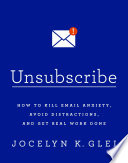

In 'Unsubscribe', the author emphasizes the importance of choice in our lives. We often find ourselves overwhelmed by obligations, notifications, and the incessant demands of modern technology. The book argues that taking control of our choices is the first step towards reclaiming our time and mental space. By consciously deciding what to engage with and what to ignore, we can significantly reduce distractions and enhance our productivity. The author provides practical strategies for assessing our commitments and filtering out the noise that does not serve our goals. This idea resonates with the notion that we are not merely victims of our circumstances; rather, we have the power to curate our experiences. This perspective encourages readers to reflect on their daily habits and make intentional choices that align with their values and aspirations.
Continue readingThe concept of digital minimalism is a central theme in 'Unsubscribe'. The author advocates for a more intentional use of technology, suggesting that we should only engage with digital tools that add significant value to our lives. This idea is particularly relevant in an age where social media, apps, and constant connectivity can lead to information overload and mental fatigue. The book presents a framework for evaluating our digital consumption, encouraging readers to unsubscribe from unnecessary notifications, apps, and platforms that do not contribute positively to their lives. By adopting a minimalist approach to technology, individuals can free up time and mental energy, allowing them to focus on what truly matters. This idea challenges the prevailing notion that being constantly connected is inherently beneficial, urging readers to reconsider their relationship with technology.
Continue readingMindfulness is another key concept explored in 'Unsubscribe'. The author discusses the importance of being present in our daily lives, arguing that many distractions stem from a lack of awareness and focus. By practicing mindfulness, individuals can cultivate a deeper connection with their thoughts, feelings, and surroundings. The book offers practical exercises and techniques for enhancing mindfulness, such as meditation and mindful breathing. These practices help readers develop the ability to pause, reflect, and respond to situations rather than react impulsively. The author posits that mindfulness not only improves personal well-being but also enhances productivity and creativity. This idea underscores the significance of taking moments to disconnect from external stimuli and reconnect with oneself.
Continue readingSetting boundaries is crucial for maintaining a healthy work-life balance, and 'Unsubscribe' delves into this topic extensively. The author argues that many people struggle with boundaries, leading to burnout and dissatisfaction in both personal and professional spheres. The book provides actionable advice on how to establish and communicate boundaries effectively. This includes learning to say no, prioritizing self-care, and recognizing when to step back from commitments that drain energy. By setting clear boundaries, individuals can protect their time and mental health, ultimately leading to greater fulfillment and productivity. The author emphasizes that boundaries are not just about limiting interactions but also about creating space for what truly matters.
Continue readingOne of the most compelling arguments in 'Unsubscribe' is the need to reclaim time for creativity. The author highlights how constant distractions and obligations can stifle creative thinking and innovation. By reducing digital clutter and unnecessary commitments, individuals can carve out time for creative pursuits that inspire and energize them. The book encourages readers to engage in activities that foster creativity, whether through hobbies, brainstorming sessions, or simply allowing time for reflection. This idea is particularly pertinent for professionals in creative fields, as well as anyone looking to infuse more creativity into their lives. The author believes that creativity is essential for problem-solving and personal fulfillment, and that it can be nurtured through intentional practices.
Continue readingWhile 'Unsubscribe' promotes digital minimalism, it also underscores the importance of authentic connections with others. The author discusses the difference between superficial online interactions and meaningful relationships. The book encourages readers to prioritize face-to-face interactions and cultivate a supportive community. By focusing on quality over quantity in relationships, individuals can experience deeper connections that contribute to their well-being. The author provides strategies for building and maintaining a strong support network, emphasizing that genuine connections can enhance resilience and happiness. This idea serves as a reminder that while technology can facilitate communication, it should not replace the richness of personal interactions.
Continue readingThe final key idea presented in 'Unsubscribe' is the importance of embracing change and being adaptable in a rapidly evolving world. The author argues that resistance to change can lead to stagnation and dissatisfaction. Instead, the book encourages readers to view change as an opportunity for growth and learning. By adopting a flexible mindset, individuals can navigate challenges more effectively and remain open to new possibilities. The author provides insights on how to cultivate adaptability, such as seeking feedback, experimenting with new approaches, and maintaining a curious attitude. This idea is particularly relevant in today’s fast-paced environment, where adaptability is essential for personal and professional success.
Continue readingThe reading time for Unsubscribe depends on the reader's pace. However, this concise book summary covers the 7 key ideas from Unsubscribe, allowing you to quickly understand the main concepts, insights, and practical applications in around 23 min.
Unsubscribe is definitely worth reading. The book covers essential topics including The Power of Choice, Digital Minimalism, Mindfulness and Presence, providing practical insights and actionable advice. Whether you read the full book or our concise summary, Unsubscribe delivers valuable knowledge that can help you improve your understanding and apply these concepts in your personal or professional life.
Unsubscribe was written by Jocelyn K. Glei.
If you enjoyed Unsubscribe by Jocelyn K. Glei and want to explore similar topics or deepen your understanding, we highly recommend these related book summaries:
These books cover related themes, complementary concepts, and will help you build upon the knowledge gained from Unsubscribe. Each of these summaries provides concise insights that can further enhance your understanding and practical application of the ideas presented in Unsubscribe.